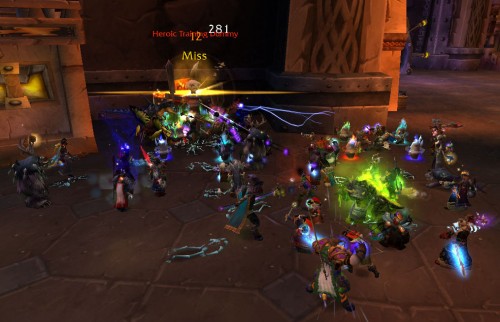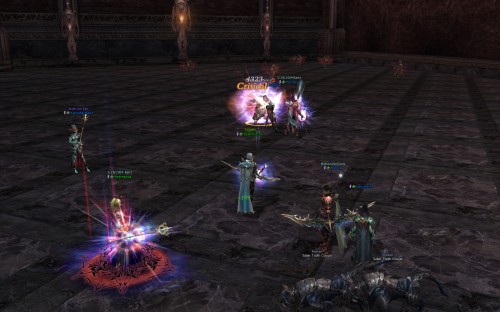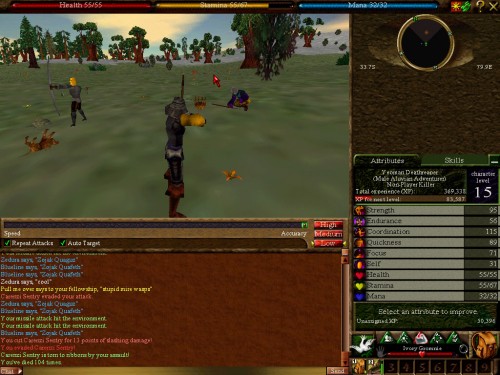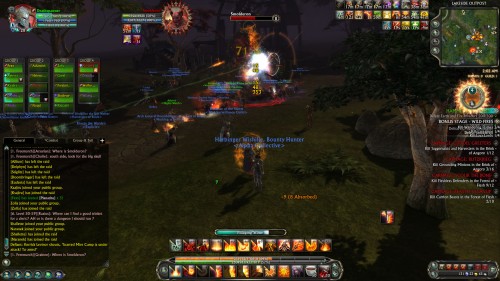- Qualcomm Launches Snapdragon 4 Gen 2 Mobile Platform
- AMD Launches Ryzen PRO 7000 Series Mobile & Desktop Platform
- Intel Launches Sleek Single-Slot Arc Pro A60 Workstation Graphics Card
- NVIDIA Announces Latest Ada Lovelace Additions: GeForce RTX 4060 Ti & RTX 4060
- Maxon Redshift With AMD Radeon GPU Rendering Support Now Available
Where’s the Challenge: Have MMOs Become Too Easy?

When World of Warcraft launched in 2004, the world of MMO gaming immediately felt its impact. Competing titles didn’t stand much chance, and some were even canceled before release – all because they didn’t follow the standard that Blizzard inadvertently created. Is this a problem? For those who appreciate a rewarding experience, it can be.
Page 1 – Introduction
As someone who has long felt that MMO games have been following the path of ease for far too long now, an article posted over at MMORPG.com by former World of Warcraft developer Mark Kern caught my eye immediately. His question is simple: have MMOs become too easy?
His answer is “yes”, and it’s a pretty definitive one. Despite being WoW‘s original team leader, he has no qualm about pointing out its faults. Sure, the game is Blizzard’s pride and joy – it did quickly become the most popular MMO on the planet, after all, and from a business perspective, the game hit the ball out of the park. From a gamer perspective, though, Kern feels that Blizzard effectively “killed a genre“.
That’s a strong statement, but it’s one I can agree with to some extent. Before we go further, I should note that I haven’t as much as signed-up for a trial of World of Warcraft; I just happen to know what it looks like, about the clones it’s inspired, and the fact that George “Corpsegrinder” Fisher of Cannibal Corpse is immortalized in the game as an NPC. Apart from that, I’m ignorant of the game, and my opinions are based on things I’ve read over the years.

Blizzard’s ultra-successful World of Warcraft
Alright – I did stretch the truth there a little. I did partake in the World of Warcraft alpha, as I had been working in some capacity with MMO developers at the time. I had a bit of fun at the time, but I truly can’t remember much about the game at all; it’s hard to believe, but it would have been nine years ago. At the time, I had no idea of what the game would become, else I might have taken it a little more seriously at the time. Alas, I had other MMOs on my plate.
A week after WoW‘s launch in late 2004, news hit the wire that someone had already reached the maximum character level of 60. Max level… in just over a week. At the time, that sort of accomplishment was unheard of. Months earlier, I obtained my first max level character in Asheron’s Call, after having played the game for two years. I was also heavily playing Lineage II at the time, and max level to me was nowhere in sight. That game took eight months post-launch to see its first max-level character.
Thanks entirely to that eager player’s accomplishment in WoW, I quickly formed the opinion that the game had to be the easiest MMO ever created. Little did I realize, things would only become even easier down the road. A good friend of mine recently told me that he had at one point gone from level 1 – 80 (then the max level) in a mere four days. The kicker: it was on top of having to work during those same days. A couple of years ago, we even learned of a player who reached the new max level of 85 without killing a single thing.

Lineage II defines “over-the-top” difficult MMORPG
At this point, we should establish something: difficulty means different things to different people. While someone might call WoW easy because someone could get to level 85 without killing a single thing, it might actually have been extremely difficult to pull off. Others might consider difficulty to be raw, unadulterated challenge… you die if you are not alert. Then there are those who may consider difficulty to simply scale with the amount of time it takes to accomplish a certain goal. WoW max level in a week? Easy. Asheron’s Call max level in three months? Challenging. Lineage II max level in eight months? Damn, dawg!
When Trion Worlds’ Rift came out in early 2011, I felt compelled to give it a try. After having played my other two MMOs for many years, I needed a fresh experience – and for the most part, it gave me one. But I ended up bailing on the game after a mere 60 hours of gametime. Why? In some ways, I just couldn’t take it too seriously.
I’d like to think that I’m a bit of an old-school MMOer, a distinction I tend to give to those who’ve played an MMO before World of Warcraft‘s release and have experienced multiple MMOs of the time (believe me – post-2004, it seems everyone’s first MMO is WoW). My love for MMOs began in January of 2002, with Turbine’s Asheron’s Call – a game I remain subscribed to today. The game back then, and even today, isn’t one I’d consider “easy”. Things will of course become easier as you learn the game, and reach higher levels, but right off-the-bat, and when playing legitimately, it’s a challenge.
Behold, my first Asheron’s Call character at level 15 with 104 deaths under his belt:

The Old Days: 100 Deaths by Level 15
To help put that into perspective, the game’s maximum level at the time was 126. Suffice it to say, I died a lot. But despite that, I never became discouraged or turned-off. Not even close – I ended up becoming addicted to the game… I couldn’t get enough. And this, despite rather challenging – and possibly even unreasonable – gameplay mechanics.
I’d love to avoid talking about a specific game too much in this article, but for the sake of being able to better explain the reasons why I feel the way I do, it’s necessary. Thus, my focal point will be my one true love, Asheron’s Call. Somewhat impressively, the death penalties in AC haven’t changed a bit in the game’s 14 year existence. Those are:
- One: You gain a death penalty which affects your stats, and like most MMOs, the more deaths you accrue while you have this penalty, the worse it gets. To rid this penalty, you must earn some XP. No amount of gold will help you here.
- Two: Again like most other MMOs, buffs are lost on death. The difference here is that the number of buffs on any given character can total 20 or more (and each takes about 2 seconds to cast – or depending on your level and configuration, someone else to cast).
- Three: You can lose items, based on value. For this reason, people tend to keep expensive items on them for the sole purpose of losing them when they die rather than their actual equipment (higher value is favored; it’s an odd mechanic). Die enough, though, and you might begin losing your gear (which can be regained once you get back to your corpse).
Some of that might sound brutal to some people, but in reality, they’re only brutal if you’re a new player and don’t seek help. The second and third penalty can be negated in later levels, and the first one isn’t much of an issue for higher level players who likely have some XP items on them to use for a quick fix. But that’s all beside the point: the game has retained those challenging mechanics since its release in 1999.
Other interesting mechanics found in AC that I haven’t seen in most other MMOs include: A) Weight limits. You have a lot of backpack space, but you can weigh yourself down; B) No character revive. You die, you go straight back to your attuned location; C) Despite being able to run faster in the game than most MMOs, some locations can still take a while to reach; D) I’m sure there’s more I could mention but this editorial is becoming long enough.
Most gamers like to see a return-of-investment for their time, and in [Lineage II] that RoI comes far too slowly.
As difficult as I make Asheron’s Call out to be (it’s not that bad!), Lineage II is another great example, if not a better one. After a death in that game, you lose about a half-hour’s worth of XP and your buffs – but can be revived in place. What makes this game even harder than AC is its sheer level grind. You might as well call it the stark opposite of WoW. As mentioned above, the first max level character (75, at the time) required six months to get the job done. When the game went free-to-play in late 2011, it took months before the first person went from 80 to 99 – and everyone except the company and the player will acknowledge that it was accomplished with some “help”.
While I’ve put quite a bit of time into Lineage II over the years, I’ve taken about five hiatuses due to the sheer grind – compare that to me never canceling my subscription to AC. There’s certainly a point when a game can become “too” difficult, or too grindy – essentially a point when you begin to feel like you’re actually wasting your life away by playing it. Most gamers like to see a return-of-investment for their time, and in this particular game that RoI comes far too slowly. It’s made worse when you die and end up losing some of your already difficult-to-earn progression. Whew.

Trion Worlds’ Rift, which many badge a “WoW Clone”
Let’s look at the contrast here. Again, I know almost nothing about World of Warcraft, but I imagine its mechanics are somewhat similar to Rift. In this game, a death means:
- One: A 10% knock to your vitality. This doesn’t affect your stats unless you decrease it to 0% (normal is 100%, naturally). At that point, your stats halve.
- Two: Gold-spending. Based on your level of vitality, you’ll need to go to a healer to bring it back up to 100%. At no point in my playtime did I ever consider this to be expensive.
- Three: If you die and don’t happen to have the free hourly spawn-in-place ability, you will need to run back to your death spot from a nearby graveyard.
- Four: You can be revived in place by a nearby friend, with a mere hit to your vitality.
I once told a friend of mine in Rift about the death penalties in AC, and his reaction was “eff that”. Based on all of my experience with AC, I can readily admit that the death penalties are less-than-ideal. In particular, the inability to revive sucks, but that all adds to the challenge. Because the death penalty is a little more severe, you tend to be way more careful – more skillful, even. You learn to keep a close eye on your party members, because you don’t want anyone to die. In many cases, you need them to not die.
Support our efforts! With ad revenue at an all-time low for written websites, we're relying more than ever on reader support to help us continue putting so much effort into this type of content. You can support us by becoming a Patron, or by using our Amazon shopping affiliate links listed through our articles. Thanks for your support!





